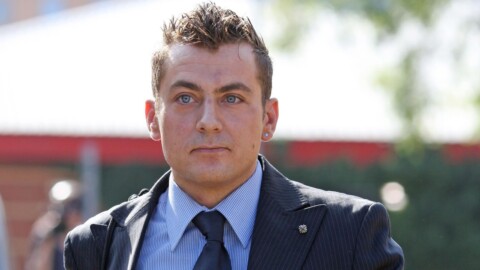Lee Montague, the celebrated BAFTA-winning actor renowned for his remarkable contributions to both stage and screen, has passed away at the age of 97.
A cherished figure in British entertainment, Montague’s career spanned over six decades, leaving a legacy of unforgettable roles across a range of mediums. He became particularly well-known for his portrayal of Henri Dupont in the beloved TV series Bergerac, a role he reprised in several episodes.
Montague’s presence in iconic series like The Sweeney and Seconds Out further cemented his place in the hearts of television viewers. His death was confirmed earlier this week by the Keats Community Library, where he served as president for life, a role that spoke to his enduring commitment to cultural and community initiatives.
Tributes to Montague have poured in from all corners of the entertainment world. Among the most poignant was one from Monty Python’s Michael Palin, who fondly recalled his time working alongside the actor.
Palin, who had shared the stage with Montague on several occasions, expressed his admiration, calling him “a pleasure to share a stage with.” The Keats Community Library, which Montague was so integral to, also expressed deep sorrow over his passing, acknowledging him as both a “highly respected actor” and a person whose contributions had been “vital to our success.”
His death leaves a void not only in the world of acting but also within the community-driven efforts he supported throughout his life.
Montague’s career was as diverse as it was distinguished. He toured with legendary figures like Laurence Olivier and Peter Brook, showcasing his talents on prestigious stages around the world.
He made his mark on Broadway, where he starred in The Climate of Eden in 1952, followed by notable performances in productions such as Entertaining Mr. Sloane and Who Saw Him Die, which ran at London’s Theatre Royal Haymarket. His film career was equally impressive, with Montague making his debut in the 1952 film Moulin Rouge.
He later appeared in significant films like Brass Target, Brother Sun, Sister Moon, and How I Won The War, the latter starring John Lennon.
Known for playing tough, complex characters, Montague developed a niche that showcased his versatility. His ability to move between stage, screen, and television demonstrated his remarkable range as an actor, a trait that made him a beloved figure in the industry.
But his contribution to children’s television was perhaps one of his most enduring legacies. In 1965, he became the first storyteller on the BBC children’s program Jackanory, a role that earned him a BAFTA award.
His voice became synonymous with the storytelling tradition, narrating 15 episodes of the show that captivated young audiences and left a lasting impression on British television.
In his later years, Montague channeled his passion for literature and culture into community work. In 2011, he was instrumental in establishing the Keats Community Library charity, a venture that sought to bring together people of all ages through reading and performance.
He often performed at the library, working alongside other renowned figures such as Robert Powell, Simon Callow, Janet Suzman, and, of course, Michael Palin. The library, which he had a hand in developing, noted how Montague’s absence would be deeply felt, remembering him not just for his acting but for his dedication to making a difference in his community.
Montague’s death also marks the loss of a personal connection for many in the industry. Actor Robert Lindsay, who had maintained a close relationship with Montague over the years, expressed his devastation at the news. He referred to Montague as his “theatrical Dad,” a testament to the deep bond they shared both on and off the stage.
The warmth and mentorship that Montague provided to his colleagues left a lasting imprint on those who had the privilege of working with him. Lindsay’s words, filled with affection, reflect the profound impact Montague had on those around him.
Sir David Hare, the celebrated playwright, also paid tribute, describing Montague as “a consummate gentleman.” This description encapsulates the actor’s character beyond his professional success.
Montague’s reputation in the industry was not only that of a highly skilled performer but also of a person of great integrity, warmth, and kindness. His peers consistently remember him as a source of wisdom, empathy, and humor—qualities that endeared him to all who knew him.
On a personal note, Montague shared a deep and loving bond with his wife, fellow actor Ruth Goring. The couple was married for 67 years until Ruth’s passing in 2023. Together, they raised two children, and their partnership both on and off the stage was a testament to their shared love for the arts.
Montague’s relationship with his family was a cornerstone of his life, and his enduring love for Ruth was a significant part of the narrative of his later years.
Montague’s family, friends, and colleagues will undoubtedly remember him for his professional achievements and the legacy he leaves behind. His contributions to both the entertainment industry and his local community through the Keats Community Library stand as enduring marks of a life well-lived.
His passing is a significant loss to the world of British theatre and television, but the memories of his work will continue to inspire future generations.
As the tributes continue to pour in, it is clear that Lee Montague’s influence extended far beyond the roles he played on screen and stage. His ability to impact lives with his art, his community work, and his personal connections has left an indelible mark.
Montague’s legacy is one of dedication, passion, and an unwavering commitment to the arts, qualities that will not soon be forgotten. His contributions to both his craft and the communities he served remain a testament to the depth of his character and the breadth of his impact.
In remembering Lee Montague, we celebrate not just an actor of incredible talent but a man whose life was marked by generosity, wisdom, and compassion.
His legacy will continue to resonate through the countless lives he touched—whether through his unforgettable performances, his storytelling on Jackanory, or his lasting influence on those who had the privilege to work alongside him.









